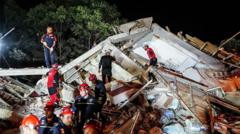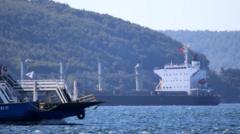Mark Lowen narrates his unexpected deportation from Turkey after covering widespread protests against the government. Detained for hours and denied contact with the outside world, he reflects on the challenges faced by journalists in an increasingly repressive environment.
BBC’s Mark Lowen Details His Sudden Deportation from Turkey Amid Protests

BBC’s Mark Lowen Details His Sudden Deportation from Turkey Amid Protests
After being detained for reporting on anti-government demonstrations, BBC correspondent Mark Lowen shares his harrowing experience of incarceration and deportation from Istanbul.
Mark Lowen, a BBC correspondent who recently found himself embroiled in a serious incident while covering anti-government protests in Turkey, has shared his alarming experience of being abruptly deported. Having just expressed his contentment on returning to Istanbul—his former home—he received a phone call from hotel reception asking him to come down immediately for an urgent discussion.
Upon arrival, he was confronted by three plain-clothed police officers who demanded his passport and led him away, attempting to prevent his colleagues from documenting the encounter. His initial three-day reporting on protests sparked by the arrest of Ekrem Imamoglu, the city's mayor and a prominent political figure, took an unexpected turn as he was taken to police headquarters and held for several hours. Despite the tension, his interaction with the police was notably polite, with some officers even expressing sympathy for his situation, hoping for his release.
As the night progressed, Lowen was transferred to a detention facility, where the mood changed drastically. Migrating from cordiality to apprehensiveness, he experienced a harsher environment with little communication and no access to legal representation. Eventually, he was issued deportation papers under the claim of being “a threat to public order,” a rationale later echoed in a statement from the Turkish government to justify his removal.
His ordeal culminated in a night spent in a cramped airport holding area before boarding a one-way flight to London. Reflecting on the matter, Lowen acknowledged that while he was fortunate to have assistance from BBC management and the British Consulate, countless other journalists in Turkey face more perilous conditions. Turkey is notoriously recognized for its tight grip on media freedom, ranking 158th out of 180 countries in the Press Freedom Index according to Reporters Without Borders.
The unrest in Turkey has been fueled by the political crackdown under President Recep Tayyip Erdogan, whose dismissive characterization of the protests as "street terrorism" hints at the rising authoritarianism in the country. The future of these demonstrations remains uncertain, but the hunger for democratic reform among the protesters indicates they are unwilling to back down, presenting a formidable challenge to Erdogan's prolonged rule.



















